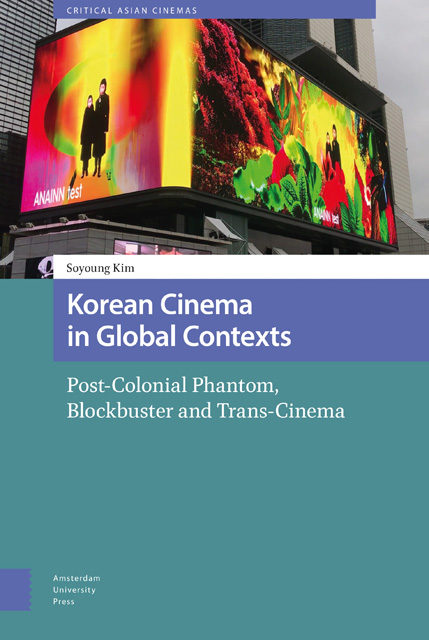9 - Geopolitical Fantasy : Continental (Manchurian) Action Movies during the Cold War Era
Published online by Cambridge University Press: 16 November 2022
Summary
Abstract
This chapter looks at Korea's “continental” action movies of the 1960s and 1970s. The absence of Asianism both in state doctrine and academic pursuits lasted through the postcolonial period up until 2003. Popular culture such as movies of the 1960s and 1970s, however, has sustained its own version of Asianism, particularly in continental action movies.
Keywords: Cold War, authoritarian regime, identification, geo-fantasy
Geo-Fantasy Elsewhere
I grew up in the military dictatorship during the Cold War era, in which restrictions were not only imposed on freedom of speech, but also on freedom of travel. Hence, when I was a teenager, I occasionally went to Kimpo International Airport purely to witness an airplane take-off. The wind felt harsh in the remote airport field. I took a deep breath and was amazed to glimpse a runway and a couple of airplanes in the air. Up until the early 1980s, international travel was only allowed for the privileged, workers dispatched to “the gulf boom,” or soldiers sent to Vietnam. Their potentially enriching experiences were, however, seldom used as distinct opportunities to learn about other cultures in Asia. Travel was purely an issue of economic gain. Crossing a border by land into the Asian continent (initially via Northeast China) was also impossible from a South Korean geoperspective because of the Cold War and the partition. As the northbound direction across the Korean Peninsula was blocked to the South, there was no travel possible over land or sea to Eurasia, including China, the Soviet Union or more distant locations. The new Asia Highway project follows exactly the routes that once were completely blocked. Since we were denied the experience of travel, we entertained ourselves by playing a globe game. As we turned the globe of the Earth around, our finger would land on random points, such as Mongolia, Russia or Nigeria. This game initiated my desire to be somewhere other than where I was. Writing about this geo-fantasy constitutes an endeavour to elucidate the desire to be elsewhere that also existed in public fantasy, as expressed in films of the period (Jackson 2005).
I oftentimes reflect on the remnants of the past and try to understand the ways in which authoritarian modalities have haunted and affected the full extent of everyday life and myself.
- Type
- Chapter
- Information
- Korean Cinema in Global ContextsPost-Colonial Phantom, Blockbuster and Trans-Cinema, pp. 175 - 188Publisher: Amsterdam University PressPrint publication year: 2022



